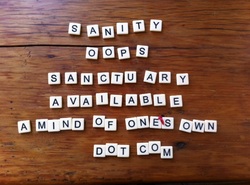Creative productivity - maintaining a writing rhythm through the end of year hype.
- This Thursday, 13th, a new Wordcount Virtual Writers' Group starts up - still some spaces open for new members if you'd like to join or know someone else who would. Even writers who usually avoid groups are loving our current Wordcount group. No hype, no overload, just practical strategies, connection with other writers and opportunities to enhance your creative productivity.
- Sanctuary for small groups - is a new program providing groups of up to 5 writers with a group session each month and weekly opportunities to build and maintain writing momentum.
- Sanctuary individual - one to one conversations each month, individually tailored to address your specific needs relating to building writing momentum.
- Implementation days - a full day set aside each month to give you a block of time and the chance to increase your output. These days are already working well for Wordcount members and I'll be opening them up to all writers in coming months. There'll be no cost or strings attached, simply a regular community event for writers - please let me know if you're interested !
- Sanity Sessions - a series of sessions for writers wanting to learn practical, effective strategies for dealing with the emotional and psychological aspects of writing. Starting in early 2015.
- Knowing how end-of-year hype can derail a writing rhythm, I'm getting in touch to let you know what's on offer in coming months, to keep you on track and connected to your writing work throughout and beyond summer.
A Mind of One's Own helps writers build and maintain sustainable writing rhythms, keeping them connected to their writing work, even through times of significant external demands and distractions.
All the best,
Alison
e. [email protected]
m. 0428.835.304
w. www.amindofonesown.com







 RSS Feed
RSS Feed